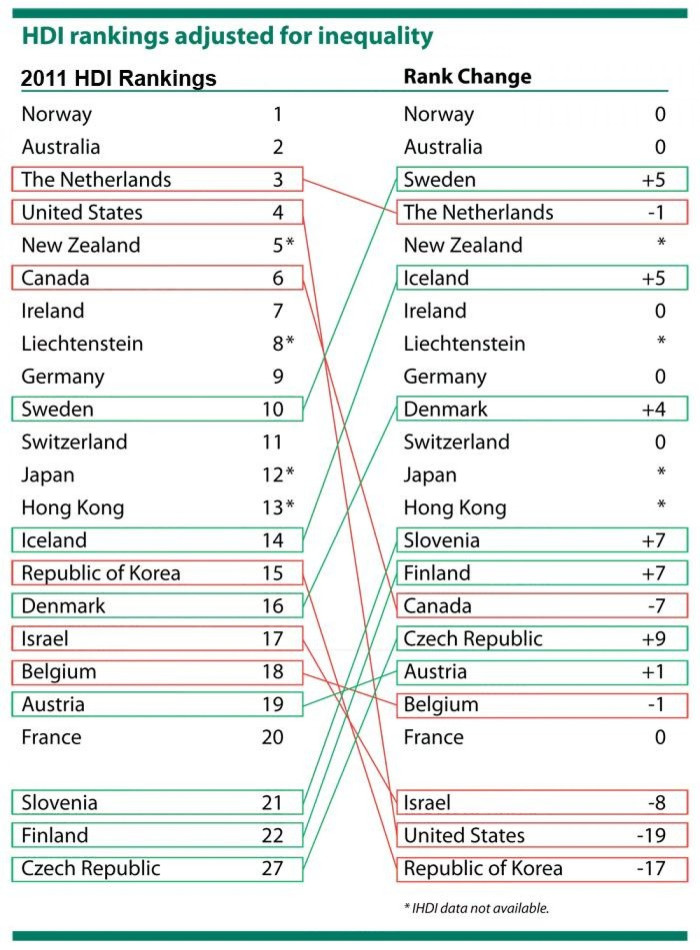Income Inequality Lowers U.S. Rank in U.N. Human Development Index

While the United States is the fourth best country live in, a new analysis from the 2011 United Nations' Human Development Report found the U.S. ranking dropped to 23 when adjusted for income, health and education inequality.
The UN Development Program's Human Development Index (HDI) has been tracking human development across the globe since 1990, emphasizing health, education, the expansion of human freedoms and economic growth. The Inequality-adjusted Human Development Index (IHDI) accounts for inequalities in the distribution of those dimensions across the population -- the IHDI equals the HDI when there is no major inequality across a nation's population.
The Inequality-adjusted Human Development Index helps us assess better the levels of development for all segments of society, rather than for just the mythical 'average' person, Milorad Kovacevic, chief statistician for the Human Development Report, said in a press release. We consider health and education distribution to be just as important in this equation as income, and the data show great inequities in many countries.
Norway, Australia and the Netherlands lead the world in the 2011 HDI, followed by the United States, New Zealand, Canada, Ireland, Liechtenstein, Germany and Sweden. However, under the IHDI some of those countries fall substantially: the U.S. ranks at 23 and Canada falls to 16, while other wealthy countries such as the Republic of Korea and Israel do not crack the top 20.
Meanwhile, many smaller European countries topped the IHDI. Norway retained the top spot as the globe's most equitable country, followed by Australia -- which was also second on the HDI -- Sweden (10), The Netherlands (3), New Zealand (5), Iceland (14), Ireland (17), Germany (9), Denmark (16) and Switzerland (11).
The UNDP reports that the United States' drop in the inequality-adjusted report is primarily due to the significant income inequality between the nation's poorest and wealthiest citizens, in addition to wide gaps in healthcare accessibility.
Income distribution has worsened in most of the world, with Latin American leading as the most unequal region when it comes to income. Yet, when adjusted in IHDI terms to include life expectancy and schooling, Latin America is more equitable than sub-Saharan Africa or South Asia.
Some Victories, but Challenges Remain
While the report notes there has been recent progress toward greater equity on much of the planet, several of the low-ranked HDI countries still suffer from below-average life expectancies due in part to deaths from preventable and treatable illnesses, as well as extremely limited educational opportunities.
The Democratic Republic of Congo was ranked last on this year's the Human Development Index. Every nation rounding out the 10 lowest-ranked countries are located in sub-Saharan Africa.
In a change from previous years, the new Human Development Report focused on relationships between environmental sustainability and equity, noting that many of the world's most disadvantaged people are also disproportionately at risk from long-term global environmental trends such as extreme weather hazards. They also face more immediate environmental threats from poor sanitation and contaminated water, which can cause preventable diseases that the report claims leads to the deaths of three million children below the age of 5 every year.
Moreover, the report concluded that problems such as worsening droughts and rising sea levels -- which impede agricultural development -- could send food prices soaring by up to 50 percent, endangering the livelihoods of millions.
© Copyright IBTimes 2024. All rights reserved.





















